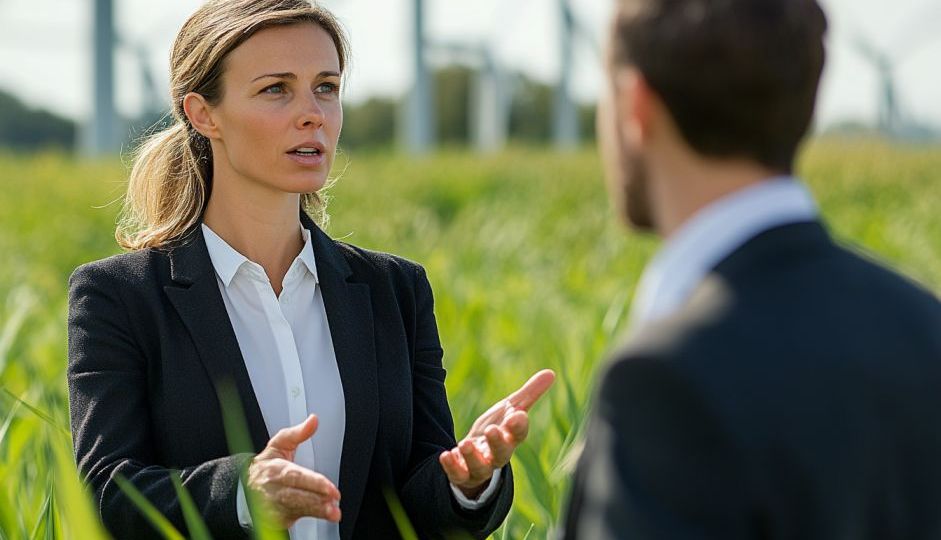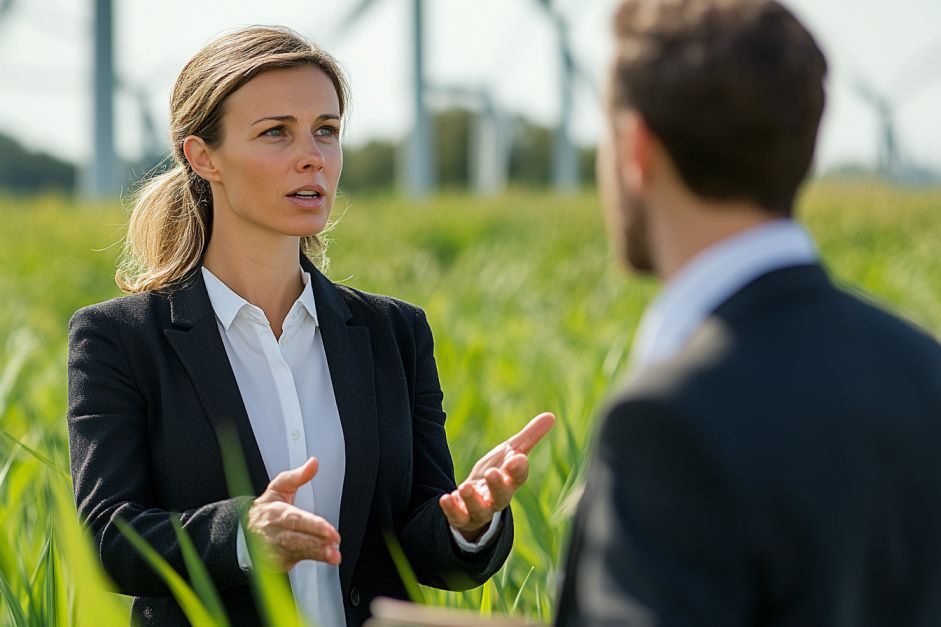

The climate is changing. Natural resources are dwindling. Switching to renewable energy is no longer an option; it has become a necessity. In 2023, renewable sources accounted for 30% of the world’s energy production (according to The Guardian) and 23% in Europe (according to Eurostat). But what does multilingualism have to do with the energy transition?
Globalisation has brought countries and companies closer. They work together to develop renewable technologies. Technology drives innovation, creates jobs, and reshapes how we produce and consume energy. These sectors are growing rapidly, and their importance will only continue to rise. Teams from all over the world are involved in these projects.
Contents
Renewable technologies and environmental care
Renewable technologies reduce carbon emissions and combat climate change. Unlike fossil fuels, they are virtually inexhaustible. Countries investing in renewable energy sources lower their reliance on fossil fuel imports and strengthen their energy security.
Renewable energy primarily comes from solar, wind, and water power.
Photovoltaic panels convert sunlight directly into electricity. Solar systems heat water or living spaces using solar radiation. Massive solar farms in sunny areas, like California, generate thousands of megawatts of electricity.
Wind turbines convert the wind’s kinetic energy into electricity. The Hornsea One wind farm in the UK generates power for over a million homes. It is the largest offshore wind farm in the world.
Hydroelectric power plants use the energy of falling or flowing water to generate electricity. The Three Gorges Dam in China is the world’s largest hydroelectric power plant by capacity. Standing 185 meters tall, it can hold back water to a height of 175 meters and stretches over 2.3 kilometres. In 2020, it produced 111.8 TWh of energy.
Global market for renewable technologies
Multilingualism facilitates close international collaboration. Translating technical documentation, reports, and user manuals is essential for projects to operate smoothly in local markets. Professional translations make sure that complex technical information is correctly implemented in each country.
The global market for renewable technologies is growing at a remarkable rate. In 2022, investments in the renewable energy sector surpassed $495 billion, marking a 17% increase from the previous year. China, as the global leader, installed over 87 GW of new solar capacity. Meanwhile, the United States and Europe expanded their wind energy capacity, installing 13 GW and 19 GW of new turbines, respectively.



International cooperation in the EU and neighbouring countries
International cooperation helps spread clean energy. Neighbouring countries often join forces on shared projects. One example is the North Sea Wind Power Hub, which pools the resources of Germany, the Netherlands, and Denmark. It involves building a massive wind farm in the North Sea. Eventually, this power station will supply power to economic hubs in Western Europe.
The DESERTEC project aims to create a network of solar and wind power plants in the Sahara region. It will deliver energy to Europe and North Africa. The initiative boosts the flow of renewable energy and supports technological and socio-economic development in desert regions.
The European Energy Network integrates renewable energy sources from various European countries. It optimises their use and ensures the stability of energy supplies. This project is accelerating advancements in energy storage technology.
Language challenges in the renewable technology industry
The renewable technology sector relies heavily on international collaboration. It brings its own language challenges. Projects involve partners from different countries. Mistakes can easily occur when there is no clear communication. They could potentially slow down or even halt progress.
Issues arise as early as the planning stage. Differences in interpreting technical specifications lead to serious misunderstandings. Poorly translated technical documents might result in incorrect installations. They cause costly delays and the need for repairs.
The misunderstandings have consequences for every stage of a project. In the worst cases, they lead to financial losses and a breakdown in trust between partners.
Technical translation in renewable technology
Technical translations in the renewable technology industry require a profound understanding of specialised terminology. Each technology—whether it is solar panels, wind turbines, or energy management systems—comes with its specific vocabulary and technical standards that a translator must be familiar with before starting the job.
Technical documentation in this sector includes user manuals, equipment specifications, and research and testing reports. Incorrect translation leads to serious errors. Improper installation or operation of equipment can result in failures.
Translators specialised in renewable technology turn complex concepts into understandable language. They must translate texts accurately while ensuring consistency and compliance with industry ISO and IEC standards. Without professional translators, projects could face numerous obstacles, and their success is jeopardised.
When products and services enter a new market, they need to be localised. That means you have to adapt them to local linguistic, cultural, and legal norms. Take, for example, a company producing solar panels that wants to enter the Japanese market. High-quality panels alone will not suffice if user manuals, technical documentation, and marketing materials are not professionally translated into Japanese. If you ignore this step, customers may struggle with installation and usage. Localisation fosters trust and increases customer satisfaction.
Language services for a sustainable future
Here are some examples that highlight the impact of multilingualism in the renewable energy sector.
International Renewable Energy Agency (IRENA)
IRENA promotes renewable energy worldwide. The agency translates its publications, communication materials, and conference content into multiple languages. They reach a broader audience and extend the impact of their work.
Case studies on coal transition
The Institute for Sustainable Futures (ISF) and the Institute for Advanced Sustainability Studies (IASS) conducted case studies on communities transitioning from coal to renewable energy. These studies emphasise the importance of integrating different perspectives and approaches. Multilingual communication helps understand and consider local socio-political contexts and gain social acceptance.
European Union Initiatives
The European Union’s multilingual digital platform for the Conference on the Future of Europe allows citizens from all member states to participate in discussions about the energy sector and sustainable development in their native languages. This platform encourages the exchange of ideas. It enables diverse language groups to contribute to shaping the future of renewable energy in Europe and finding innovative solutions.
Integrating green and technological solutions by entrepreneurs
Multilingualism enables effective knowledge transfer and collaboration among scientists, engineers, and industry experts. All for a more sustainable future. It allows for:
- Sharing best practices and technical expertise across language barriers.
- Creating international research partnerships and joint projects.
- Participation in global conferences and forums on renewable energy for a wider audience.
The ability to communicate in multiple languages makes it easier to localise renewable technologies and training materials for various markets. This includes:
- translating technical manuals, safety guidelines, and operational procedures;
- providing training and education in local languages for workers and technicians;
- adapting marketing and informational materials to local linguistic and cultural contexts.
Multilingualism helps to navigate international and local policies related to renewable energy. It facilitates:
- better understanding and implementation of global agreements on climate change and renewable energy;
- effective communication of national policies and regulations to international stakeholders;
- compliance with local regulatory requirements in different language regions.
Communicating the benefits and impact of renewable technologies gains public support. This involves:
- conducting public consultations and engaging stakeholders in local languages;
- translating environmental impact assessments and informational materials for the public;
- addressing concerns and misconceptions about renewable energy.
Renewable energy companies look to expand into new markets and attract international investments. They need to focus on:
- translating business plans, financial reports, and investment proposals;
- negotiating contracts and partnerships despite language barriers;
- marketing products and services to a diverse linguistic audience.
Translation services for the energy industry
Is your company in the renewable technology sector? Are you planning to enter new international markets? Our translation agency specialises in technical translations tailored to the renewable energy industry.
We translate technical documentation, user manuals, and research reports with attention to every detail. Our translators are specialists with experience in the renewable energy sector. They understand the industry’s specifics and terminology.
We adapt content to local markets, with cultural and linguistic contexts in mind, to ensure your technologies are well-received in any place in the world. Contact us, and we will provide a free quote.

